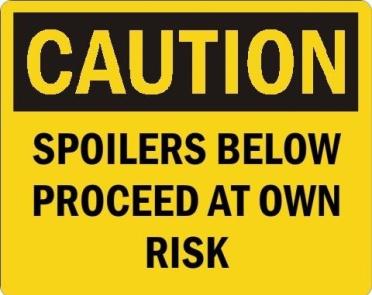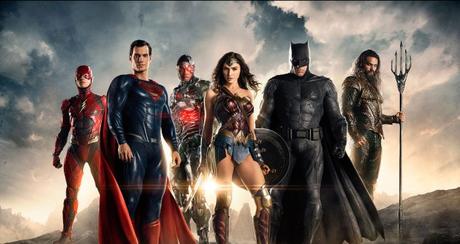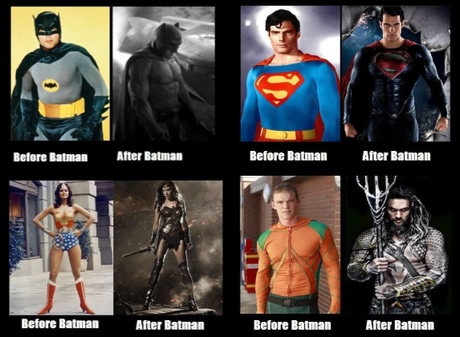Has 'The Batman Effect' Negatively Impacted the Success of the Justice League Movie?
As the highly anticipated Justice League movie continues to screen across the world, a steady stream of disappointed people are utilising various mediums to express their views. The most common complaint I have seen so far is that the characters - or rather the depiction of them in this specific movie - are sorely lacking in both backstory and general personality.
So, what happened?

The Justice League movie will be discussed in detail in this article - there will be spoilers if you have not seen it yet.
You have been warned.

As the characters themselves seem to be a major criticism point of the Justice League movie, let's have a good look at each of them before we try to figure out why the movie was so poorly received.
Let's start with Wonder Woman, the one character who is being consistently praised as being the only decent thing in the movie. There is a reason for this, and it's not 'girl power'. The real reason? Diana's backstory - seen previously in the year in Wonder Woman - helps Justice League make sense. We understand references to her past and how they have affected her personality and decision-making choices. We also know where we are when Paradise Island is attacked and then burned to the ground. However slight, we have already formed an emotional connection with the Amazonians, and that helps us deconstruct what is going on in Justice League's scrambled narrative. Scenes with Diana in automatically become highlights, simply because they are more relatable.
But what about Batman and Superman, both of which have extensive backstories in DC movies already? Unfortunately, neither of these characters are consistent in Justice League. As such, they don't inspire confidence or attract attention. Their appearances are fleeting, and forgettable.
Batman is both stupid and useless. He fails to understand what the other hero's abilities are despite having files of information on them (which he initially views obsessively); and scarcely touches his utility belt, instead opting to move around in tanks and planes. Outside of them, he becomes a ragdoll. Perhaps even more annoyingly, Bruce can't seem to stay in a consistent mental state, fluttering between optimism and paranoia so frequently you begin to question the character's stability.
Superman is dull, with little to no insight into his character, or ironically, his humanity. This contrasts sharply with previous movies, in which he is obsessively focused on what his place is in the world. After being brought back to life, he's like a blank slate acting only as a conduit for his raw power. This doesn't seem to change much, even after Lois's intervention. Attempts at humour fall flat, partly because the jokes themselves are terrible, and partially because Superman remains rather disconnected through the delivery.
What about the other half of the Justice League?
The problem here is not a lack of continuity with previous movies - as was in the case of Batman and Superman; but rather a lack of relatable backstory altogether. It's impossible to connect to them, because there is nothing cohesive to connect with. However, these are not new characters. Going into the cinema, we already have an idea of their backstories, but the movie messes with these understandings, twisting existing notions drawn from other popular DC television series in a way that leaves us unsettled. Now, logically, movies require the use of different narrative structures and flow to TV shows. Time moves more quickly, simply because there isn't as much of it to utilise.
This was perhaps ironically most noticeable in the character portrayal of the Flash. A lot of people would have watched the movie subconsciously comparing the character with the Barry Allen out of the highly popular TV series The Flash. The result is jarring, as they are nothing alike. And yet they kind of are. That's the problem when attempting to build a character using very similar material with a fraction of the time. The order of events gets messed up so to suit the movie's flow. Quirks and habits that are usually slowly introduced throughout a 23-episode season are compressed into 20 minutes of screen-time, at most. Because of this, small moments become big ones, and often - as in the case of the Justice League - they become the punch line of a joke. I don't think the Flash here was necessarily a bad character, but I do think the movie tried way too hard to make him comparable with an already well-established, and well-loved character.
Cyborg is - like Superman - dull and one-dimensional. It was a little satisfying to see them both flat on their backs laughing at each other's pain at the end of the movie. For me, that was the only real moment of character development that Cyborg really displayed throughout the entire movie. Regardless, I still found myself agreeing with Diana, when she declared that she 'works with children'. In the case of Cyborg, Justice League took a highly complex character who is coping with an extremely volatile situation and shaped him into a moody, disagreeable, petty teenager. And whilst this may be more believable for the circumstances than the lovable, joking, but still emotional character from the Teen Titans... we still feel like we've just received a bad case of whiplash.
Lastly, Aquaman. This was one of the most disappointing things in the movie for me. You can tell they tried really hard to revive Aquaman in this movie. The problem is, they dumped way too much information, without really explaining any of it. Whilst this sets the character up nicely for the upcoming Aquaman movie, it doesn't benefit the present. There is little point in having a character that only makes sense within a movie retrospectively. The movie doesn't showcase any of Aquaman's abilities either. For the most part, he just swims really fast everywhere, is stronger and more agile than anyone in the team besides Superman and Wonder Woman, and is victim to a few sarcastic jabs on being able to 'talk to fish'.
Now, time to get really analytical. Many of you are probably aware of something termed 'The Batman Effect'. Whilst this term is used to refer to many different things, from early-childhood development to sneaky ninja skills; the specific phenomena I am referring to is the change in portrayal of DC heroes in the film industry after the release of The Dark Knight trilogy.

The Dark Knight trilogy introduced us to something that was previously lacking from many superhero movies: the anti-hero. Bruce Wayne was tormented, stuck in an endless cycle of crime, pain, and grief. Suddenly, the hero wasn't a shining beacon of hope, forever optimistic, here to save the day with a great deal of cheerful fanfare. A DC hero became a soldier who made the hard choices - however dark, a character whose work was never done.
These dark tones bled into the next Superman movie. Superman Returns, although well-received, is questioned on its 'melancholy tones'. Clark Kent, previously an optimistic and confident character suddenly becomes introverted and doubtful. The same happens in Man of Steel. Superman gets fixated on what it means to be human, so much so that the movie struggles to move past it at all.
In Batman vs. Superman: Dawn of Justice, we see both Batman and Superman at their worst. Both are portrayed as almost bitter, obsessed, and desperate. The theme isn't limited to the two main characters either. In Batman vs. Superman, Alfred - usually a positive mediating force for Bruce - begins to feel more like a back-up Batman with the same surly attitude. Even the minor characters are wry and sarcastic.
In the Justice League, we get the same grumpy Alfred who eventually ends up sulking at home because he's been benched from the team; and a Batman who is consumed by the guilt of Superman's death, trying to make things right by saving the world. But that's as far as their character developments go. As we've explored above, Flash and Cyborg are portrayed as the ones left behind - the 'accidents' - but are not given the room to become their own heroes. Wonder Woman and Aquaman are glorified relics of the past, defined by the quality of their backstories. Superman, after his return, is a shell of the bright hero he once was.
So why has this happened? Is the new Justice League's poor debut the effect of a gloomy cloud that has fallen over DC, or is something else to blame?
I will now look at one other thing in particular that I was very dissatisfied with after watching Justice League. As the credit's rolled, I couldn't help but wonder. Who wrote the script for Justice League? If you look past the corny jokes and the awkward conversation that are currently defining the characters and the discussion of this movie, you will notice a massive problem that is swallowing the movie whole. The writing is terrible. The best parts of this movie are the fight scenes, not because they're any good - I've seen far better - but because no one does much talking. The main plot is perfunctory, and the end hugely dissatisfying ( what does everyone think all that alien flora is going to do?!?!). The subplots serve to do little more than bewilder the audience, distracting them from gaping plot holes and creating the illusion that more is happening than there actually is.
I personally don't believe that the characters themselves are the failing point of this movie. They need work, there is no debating that. However, there is only so much an actor - no matter how brilliant - can do with an awful script. DC also do desperately need to inject some hope and cheer into their universe if they want future attempts to succeed. They did try to do that here with Superman and Flash. However, in the case of Superman, they stripped away the gloom and then failed to provide anything to take its place. With the other characters, they seem to be disturbingly taking the beaten-down hero approach yet again.
Despite all this, what I believe is the greatest failure of this movie is that it depends too much on previous chapters to support its entire plot-line; regardless of them having little-to-no relevancy to the movie's attempted plot. The writing wanders, not sure which direction to go in because it's trying too hard to do everything at once. Combined with bleak and uninspiring heroes, the result doesn't exactly live up to expectations.

